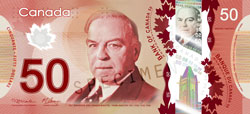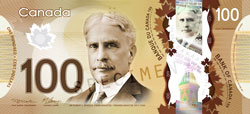Money
Canada’s official currency is the Canadian dollar ($). There are 100 cents (¢) in a dollar ($). Coins have different sizes, shapes and colours. They have nicknames that Canadians use in everyday life. These include:
Coin
| 1¢ | penny (the penny was removed from circulation in 2012) |
|
| 5¢ | nickel | |
| 10¢ | dime | |
| 25¢ | quarter | |
| $1 | loonie | |
| $2 | toonie |
Bills
The Bank of Canada released series of polymer bank notes or bills. Each bill is the same size but a different colour. The most common bills are:
| $5 | blue |  |
| $10 | purple |  |
| $20 | green |  |
| $50 | red |  |
| $100 | brown |  |
Exchanging foreign money into Canadian money
Before coming to Canada, it is a good idea to change some money from your home country into Canadian dollars. You can also exchange money after you arrive. Most airports have foreign exchange offices. You can also get cash from automated banking machines (ABMs are also known as automated teller machines) using a foreign debit or credit card.
Sending money
If you send money through the mail, do not send cash, you may:
- Use a cheque, money order or bank draft.
- Directly transfer money into account at the bank. Buy a money order at the post office.
- Wire money through private money order or transfer services.
- Send money with Interac e-Transfer
Some of these transactions cost money. Make sure that you know the cost before you transfer money.

